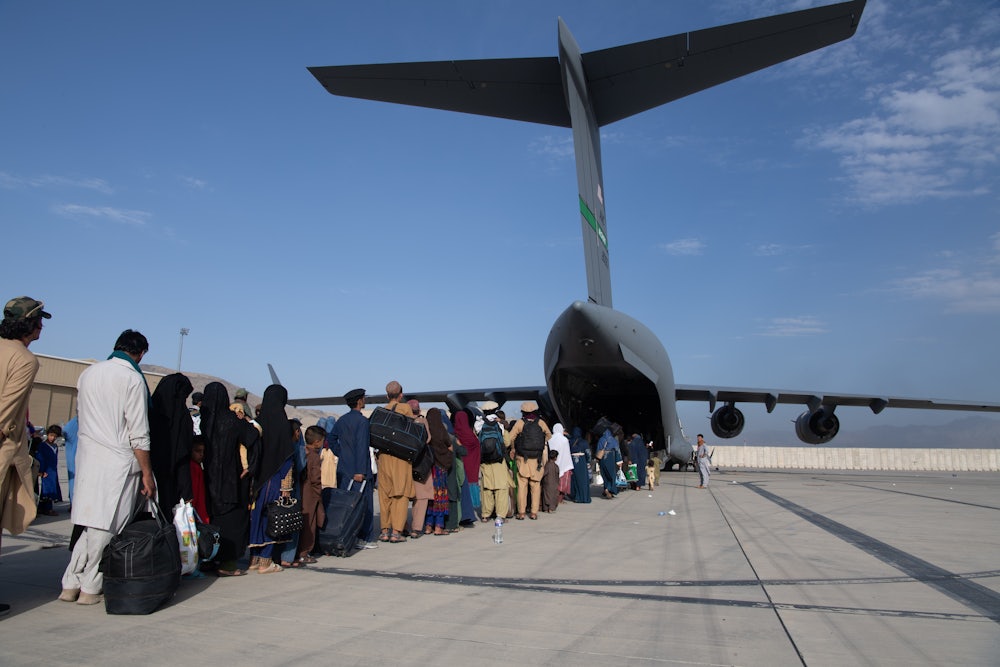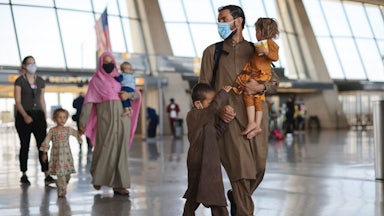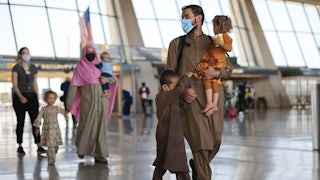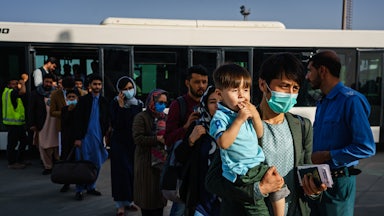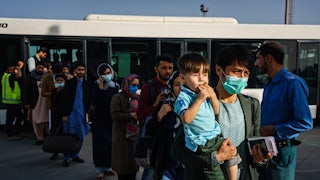The exterior of the restaurant is unassuming, tucked into a strip mall in Laurel, Maryland. But walking through the glass doors of My Kabul is transporting: Photos of Afghanistan, with its stately mountains and clear blue lakes, line the wall, while the smells of Afghan food waft from the kitchen. Visible behind the bar is a copper tureen for making sheeryakh, a traditional Afghan ice cream that tastes like creamy, cardamom-infused soft serve. One elderly patron who entered My Kabul “couldn’t stop the tears,” owner Khalis Noori recalled to me, because it reminded her so strongly of home.
For Noori, the restaurant is more than just a business, but an important strand of connective tissue for the larger community of Afghans who have resettled in the area. Its mission extends beyond serving meals: It aspires to be a refuge for those who evacuated Afghanistan in the midst of the chaotic U.S. withdrawal from the country two years ago, and whose lives are still mired in uncertainty. Specialties like mantu, delicately folded dumplings filled with spiced meat, and bouranee baudnjan, a fragrant dish of silky eggplant, encourage Afghan visitors to remember their home—and, through the healing powers of food and company, relieve some of the burden and trauma of evacuation and resettlement.
The second anniversary of the U.S. withdrawal from Afghanistan, and the collapse of the Afghan government to the Taliban, is particularly fraught for the Afghans who were evacuated to the United States. It is a reminder of the homeland and family left behind, as well as the still unfulfilled promise of the federal government to aid the Afghan people, particularly those who served alongside the U.S. military. The difficulties inherent to resettlement, such as learning a new language and adapting to a different culture, are exacerbated by uncertainty around their future.
When I first met Noori last spring, he was the field director for a temporary resettlement facility in northern Virginia operated by the Lutheran Immigration and Refugee Service, or LIRS. Like many of the employees at that facility, Noori arrived in the U.S. in August of 2021. Now, he divides his time between serving as director of the resettlement and integration programs at the Frederick and Arbutus locations of Lutheran Social Services of the National Capital Area, and helping to run My Kabul with other Afghan families. (The restaurant, which also employs multiple Afghan evacuees, opened in May.)
The challenges currently faced by resettled Afghans differ slightly from those of a year ago, Noori told me. Instead of struggling to obtain housing and employment—as well as reliable transportation between the two—evacuees must now contend with maintaining their legal status to remain in the U.S.
As the U.S. withdrew and Kabul collapsed in the summer of 2021, tens of thousands of people were evacuated from Afghanistan. Around 80,000 of them were resettled into the U.S. through humanitarian parole, allowing the Biden administration to circumvent the lengthy and backlogged asylum application process. But humanitarian parole only allows for temporary residency for two years—which, for most Afghan evacuees in the U.S., would mean that their status would expire this August.
Although the Biden administration extended the parole for another two years, Afghans resettled in the U.S. must apply for re-parole, unless they are in the midst of the asylum application process. Noori told me that none of the clients he works with who applied for asylum have received notification that they may remain in the country legally. This delay in turn could worry employers unfamiliar with the nuances of the immigration system, who may be uncertain as to whether the evacuees are still permitted to legally work in the U.S.
“The majority of these families have just recently tried to start their lives. And they are working, they’re providing for themselves and their families,” Noori said. “At the beginning, resettlement agencies were there to help them, but now if they become jobless, unemployed, then who is going to provide for them and their families?”
The Afghan Adjustment Act, which was reintroduced in Congress last month, would provide a pathway to permanent residency for Afghan evacuees in the U.S. contingent on additional vetting. But despite a push by a bipartisan group of senators, the legislation was not included in the Senate version of the annual defense authorization act.
Helal Massomi, the Afghan policy adviser at LIRS, told me that the lack of action on issues of residency had left Afghans feeling “disappointed” and “betrayed.” She noted that many Afghans had been brought to the U.S. in part because representatives and senators advocated for their evacuation and resettlement, and now, political considerations are preventing those same members of Congress from taking action.
“There might be a lot of conflict between the parties, between this side of the aisle or the other side of the aisle, but they shouldn’t put the burden on the Afghans who have been through hell for the past two, three years,” Massomi said. “I see a lot of people are being depressed because they’re worried that they will be kicked out of their places that they’re staying, that they will be kicked out of the jobs that they’re having, that they will be kicked out of this country any time of any day.”
Massomi left Afghanistan on August 21, 2021, one in a group of women, including musicians and journalists, fleeing from the new Taliban regime. She is the only member of her immediate family in the U.S.; her relatives are now in Pakistan, having left Afghanistan in the middle of the night after Massomi’s mother was threatened.
“It’s traumatic. I actually have been having nightmares about the withdrawal, and [with] the articles all coming up about the second anniversary,” Massomi told me.
In addition to reckoning with her own trauma, Massomi works to help other Afghans resettled in the U.S., as well as those remaining in Afghanistan or in third countries, in her work for LIRS. Her current focus is advocating for the Afghan Adjustment Act with members of Congress.
While the State Department has streamlined the SIV application process, there are thousands of Afghans who helped the U.S. military still trapped in Afghanistan, their lives in direct danger from the Taliban. According to a June report by the Office of the Inspector General for the State Department, more than 200 holders of special immigrant visas, or SIV, remained in Afghanistan as of March, as well as more than 150,000 SIV applicants. There are also thousands of people who aided the U.S. military but are not currently eligible for SIVs, as well as Afghans in third countries like Pakistan who are seeking to obtain visas to enter the U.S.
Along with providing a path to permanent citizenship for Afghan evacuees in the U.S., the Afghan Adjustment Act would expand eligibility for SIVs to include previously omitted groups, such as the Female Tactical Teams of Afghanistan, who helped the U.S. military hunt down Taliban targets during the conflict. It would also create a task force to help Afghans outside of the U.S. obtain SIVs, and require the State Department to respond to inquiries on applicants from members of Congress.
Veterans groups have been among the most supportive of the Afghan Adjustment Act. Its near inclusion in the Senate’s version of the National Defense Authorization Act was a step forward, advocates say; many remain hopeful that the measure could end up in the final version of the bill negotiated by both the House and the Senate.
“I’m feeling really optimistic that our commitment, although very late, is going to be kept,” said Shawn VanDiver, the president and chair of the board of #AfghanEvac, a coalition dedicated to facilitating the relocation and resettlement of Afghan allies. VanDiver told me that he believed it was “realistic and reasonable” for Congress to pass the measure, as well as “the least they can do.”
However, it’s unclear whether it will have sufficient support from conservative Republican lawmakers, particularly in the House. The House Foreign Affairs Committee is investigating the withdrawal from Afghanistan, but key Republicans like Committee Chair Michael McCaul have not signed onto the Afghan Adjustment Act. In the Senate, a cadre of conservative Republican lawmakers have introduced their own bill to aid evacuees settled in the U.S., but critics note that legislation does not address SIV eligibility, and would severely limit the president’s ability to bestow humanitarian parole.
Senator Amy Klobuchar, the lead sponsor of the Afghan Adjustment Act in the Senate, said in a statement that “negotiations are ongoing” to garner sufficient support and pass the bill.
“The bipartisan Afghan Adjustment Act has earned the support of leading veterans groups, national security experts, and our most esteemed military leaders because it strengthens our national security and does right by our Afghan allies, all while showing the world that when the United States of America makes a promise, we keep it,” Klobuchar said, adding that “we cannot and will not give up on this legislation” or on the Afghan evacuees settled in the U.S.
But inaction by Congress isn’t the only roadblock to successful resettlement. Despite administration efforts to continue to parole Afghans, VanDiver expressed frustration about the frequent miscommunications between the State Department and its contractors and Afghan evacuees, saying that these issues often required volunteers to act as intermediaries. That messaging can be “inconsistent, incorrect, or panic-inducing,” he said. A factually incorrect message from the National Visa Center, for example, or a lack of communication about what evacuees can expect once settled in the U.S., can complicate an already unstable situation.
“What it results in is our volunteers working throughout the night ... to clean up the messes that come from a contractor or U.S. government employee just not checking their fucking tone, or their cultural appropriateness, or just the accuracy of a message,” VanDiver said. “The communication piece is simultaneously the most important thing, and the thing that has caused so much harm.”
Massomi said that she was “thankful” for the actions of the administration and Congress, but added that “it’s not enough.” She raised the example of priority two visas, also known as P-2 visas: Many Afghan women in danger from the Taliban regime are eligible for these visas, but they must be referred by an American citizen and travel to another country to have their application processed.
“I think one thing that both sides of the aisle agree on is the Afghan women’s situation. And they always talk about it, and they always say that ‘we’re going to do something about it.’ If not now, when are they going to act?” Massomi said. Massomi said that she has applied for humanitarian parole for her family, but has not yet heard back from the U.S. government on the status of that application. Her sister has submitted a P-2 application, but that has not been processed.
For Massomi and other Afghans, the question remains whether lawmakers will take the necessary action to help those left behind, and those adapting to life in their new home. “In the collapse of Afghanistan, the role of the U.S. was huge. And right now is the time for the United States to take care of [Afghans],” Massomi said. “I mean, it’s late, but late is better than nothing.”
For his part, Noori hopes that the U.S. government will help Afghans open and maintain small businesses like his own, as well as pass the Afghan Adjustment Act to ensure that those brought to this country, and those left behind, are able to move forward.
“People are really worried about their future, about their livelihoods. It just disheartens them to know they’ve got an uncertain future,” Noori said. “So far, the treatment of the Afghan refugees by their communities has been amazing. The resettlement agencies have been there for the clients. But the government, the Congress, they need to step up.”
